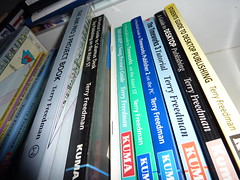Many people have the impression that spreadsheets are complicated, used for number-crunching, and hold little of interest to the writer. However, as an organisational and time-saving tool, a simple spreadsheet is hard to beat. Here is how I use them in my writing.
Read MoreOn the whole, I am against the idea of writing in return for no money. We all of us have to eat, and find the money to pay the rent or mortgage. Moreover, the more people who are willing to write for nothing, the less likely it is for editors to pay for work. Unfortunately, the usual law of supply and demand prevails, which is to say that the greater the supply relative to demand, the lower the price in the marketplace. Even though the products being offered are not likely to be the same, if an editor needs an article, or is on a tight budget, price may well be the deciding factor.
Read More Polish Your Fiction is another title in Jessica Bell’s “in a nutshell” series. It is subtitled “A quick and easy self-editing guide”, which is a very apt description.
Polish Your Fiction is another title in Jessica Bell’s “in a nutshell” series. It is subtitled “A quick and easy self-editing guide”, which is a very apt description. Polish Your Fiction is another title in Jessica Bell’s “in a nutshell” series. It is subtitled “A quick and easy self-editing guide”, which is a very apt description.
Polish Your Fiction is another title in Jessica Bell’s “in a nutshell” series. It is subtitled “A quick and easy self-editing guide”, which is a very apt description.









